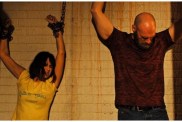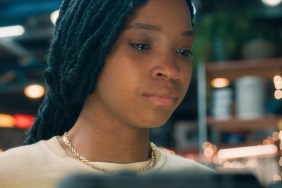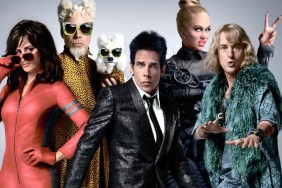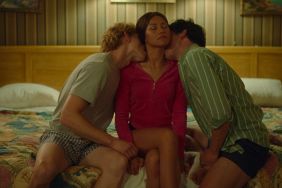As Faster gets ready to racing into theaters, ComingSoon.net got stars Dwayne Johnson (making a welcome return to hardcore action as an ex-con with a burning vendetta, an arsenal of firearms and a very speedy Chevelle) and Billy Bob Thornton (as a washed-up, drug-addicted detective hoping to clear one last case) to step off the accelerator just long enough to hit us with the down-and-dirty details behind their adrenaline-fueled crime noir.
Q: Dwayne, in the past few years you’ve downsized, some thirty pounds. In this movie you look bigger again. Is bigger better?
Dwayne Johnson: Well, bigger is always better! I’ve worked my butt off for this movie and it was a role that I was excited about playing. And it fit with the character who was incarcerated for ten years, and nine-and-a-half of those years were in solitary confinement. The prison population in that environment, the type of training that they do is very unsophisticated training, moving weight. There’s a density to a lot of prisoners’ muscularity when they train like that over a period of years. So talking with [director] George [Tillman Jr.], and again, I worked my butt off for the role
It was about probably three-and-a-half months of training, but it was maybe ten pounds, I think it was ten or twelve pounds. I think in that prison culture, when those guys train and you watch them train, we had the great fortune of sitting down with a couple of individuals who had served a lot of time in maximum security prisons for a variety of crimes–including murder–and getting into their psyche and their thought process and their perspective on what its like to take another man’s life. But them training themselves in a prison yard, it’s a raw type of training. It was probably about three-and-a-half months.
Q: Billy Bob, can you talk about the idea of being a heroin-addicted detective and if that signals something morally ambiguous about this guy from the start?
Billy Bob Thornton: I didn’t work my butt off in terms of being a drug addict. I suppose right off the bat you see that the guy has dipped pretty low in his life, and I think that it makes for more of an interesting character than there just being a cop in the movie. I think one of the flaws in most commercial action movies is that the characters are not usually very developed. They’re just there to service the job. In other words, a lot of the times you’ll have the movie star hero and then some bad guys who are just there to be killed by the hero and they’re nameless, faceless people. And as a result, you’re usually not afraid of them because you don’t seem them as somebody to just pass the salt or you don’t see them with their kids or whatever. So in this case, which is a tribute to the screenwriters, they gave each character some type of story. That sort of world-weariness of the character, I think, added to the movie because then he’s not black or white. It puts him in a very gray area.
Johnson: It’s really so nice to be a part of a movie and part of a story that is rooted and grounded in today’s world of spectacular FX and dazzling CGI. I can appreciate those movies, and I’ve done them myself. But it was nice as an actor to be a part of that type of rooted, grounded reality and have all the action and intention and motivation across the board, whether it’s physical, whether it’s killing, whether it’s communicating with his son, whatever it maybe fueled by emotion. Everything was just fueled by emotion. So that was very, very nice and refreshing.
Q: Dwayne, when you first read the script did you think of your character as a hero or more as a cold blooded killer? There’s really a fine line there?
Johnson: When I read the script I didn’t think of him as a hero, nor did I think of him as just a cold blooded killer. I thought of him as a man who was tortured. There was a lot of turmoil going on. As he discovers things along the way we as an audience discover things along the way, too, as well. That which he thought would bring him gratification by killing these men who killed his brother just brings him more pain. I looked at him as a man who I felt connected to in a way where the notion of you took something from me, something that I loved and the only thing that loved me–my family–and now you’re going to pay. I would go to the ends of the earth to protect my family. I think we all would. So that was something that resonated with me. I read the script and I immediately connected with that, just, again, a man who would do anything to protect his family, the only family he had.
Q: Both of you guys have done diverse movies, but how do you come to the set without preconceived notions, since you have such certain established public images from your films, and just find each other as actors in scenes? How did you navigate that?
Thornton: That’s easy. You never look at another actor like that. I think that actors are pigeonholed sometimes, and they’re portrayed that way by other people, but I don’t think that we think of each other that way as much. With Dwayne, I’d seen him do several movies already and I was interested in him as a human being. We didn’t really know each other until shortly before the movie, but we had mutual friends and we were always sending messages back and forth, like, “Hey, we have to do something together,” that kind of thing. But I was aware of him as an actor. More importantly, you can kind of tell: That’s one of the reasons that I don’t always audition people for movies when I’m directing. I’d rather sit and talk to them for a few minutes. And so if you look at a person that way as opposed to, “Oh, that’s the guy who played The Scorpion King but then he was also the Tooth Fairy,” I don’t really think of it that way. I just think of that guy and whatever their specific vibe is. And you also try to stay enough in your own character where you’re kind of surprised by people every day.

Johnson: Not only not knowing each other that much before we worked with each other really helped, but also I agree that, with Billy Bob, I’d been a fan for such a long time and I can always admire careers–and especially diverse careers–and someone who locks onto something, whether it’s in a comedy or a drama or the variety of things that he’s done, and really wants to knock it out of the park and give solid performances. I’d been a fan of his music, too. I remember buying his first CD and we talked about that years and years ago. We have a love for very traditional country music. So it made it very easy for me, and I was always intrigued with Billy Bob as an individual and as a person and how forthcoming he’s been throughout the years with a lot of things that he’s done, and especially in our industry.
Q: Was it important for you after various and successful collaborations with Disney to return to kicking ass in a hard R-rated film?
Johnson: It wasn’t necessarily important for me to go back and kick ass and make an R-rated movie. It was just a matter of getting good material that really resonated with me that I’d been waiting for, for some time. I enjoyed the work that I’ve done in the past whether it was Disney or some of the other studios that I’ve worked, doing comedy and family movies, but the philosophy has always been pretty clean and straightforward, which is that if I see something that I like and I can see it’s value to the audience and it’s value to me then I’m going to take my shot at it regardless at the genre. This happened to come along at a time that I’d been waiting for something like this, for a long time. It was something that I could sink my teeth into. It came along. I read it. I loved it and I wanted to do it
Action for me, the genre, has always been my home. I’m a physical guy and I love that and I enjoy it, but it was also important for me to have a diverse career. I didn’t want to be defined ten years ago. This is my tenth year now. Ten years ago I didn’t want to be defined or pigeonholed, like, “Oh, you’re the action guy or the comedy guy or the family guy.” I really wanted to do everything, take my shot at it and hopefully give good, solid performances and hopefully get better over time. And working with actors like Billy Bob help me elevate my game and working with great directors and great material.
Q: Billy, how much time did you have with Carla Gugino before the film to develop your characters’ relationship? It’s so real onscreen and you can feel a history there.
Thornton: I didn’t know Carla before the movie, and she’s such an easy person to work with. She blends into a scene so easily. I was very fortunate in that case because Carla was cast not too long before we started the movie. So we didn’t have any time really. I think that Carla is one of those actors who sometimes is overlooked as a really terrific actor. Not that people don’t respect her and think that she’s great, but sometimes when someone is really good in the part and they don’t try to eat the walls off they can be overlooked because they’re so good that you don’t notice it, because you buy them in the part. I think that Carla is one of those. She was terrific and couldn’t be a nicer person. And I have to say that one of the hardest things on this movie people ask what was hard about doing this movie and I’m trying to think about it because there wasn’t really anything hard to me about doing this movie, other than reminding myself that I was in this very intense dark movie and where that character was, because everybody on this movie was so nice I couldn’t believe it. I mean, Dwayne is the nicest guy that you’ll ever run into. George Tillman, you don’t see directors like this ever. At some point during a movie, always, you want to pull the director outside and say, “Listen, you didn’t create this thing, do you understand me? This person over at that studio hired your old bones to come out and resurrect your ass,” or whatever. And this guy, everyday I’m like, “Would you yell at me?” The writers are like, “Hey, you have any ideas?” I thought, “Am I in like Disneyland or something?” So that was the hardest thing about it. With people like Carla and Dwayne and Moon Bloodgood who played my wife and even the little kid, just everybody, they were just fantastic. I know that a lot of these people don’t get mentioned sometimes, and I do have to say this one thing about the little boy that played my and Moon’s son [Aedin Minks], he came up to me when we first got there. I didn’t even know the kid yet. And he walks up to me and he goes, “Hey, I loved you in ‘Bad News Bears,'” and I said, “Well, thank you.” I’m used to that from kids and you’re always glad that it’s “Bad News Bears” and not “Bad Santa!” But he walks up and he said one of the weirdest and funniest things that I’ve ever heard anybody say to me on set, which was, “Hey, do you watch the Capital One commercials with those Vikings?” I go, “Yeah, I do. I love those things. They’re very funny.” He goes, “You know the fat kid?” I said, “Yeah.” He goes, “That’s me!”









